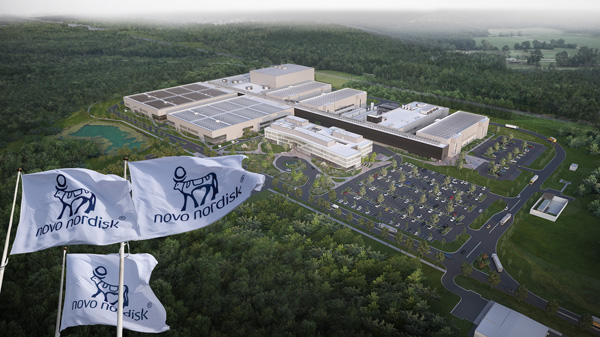Denmark’s Novo Nordisk has been producing and growing its business in Clayton, North Carolina, for 31 years. It’s not about to make an all-in bet on the state without having its ducks in a row.
In June the 101-year-old company, whose sales in the first half of 2024 reached $19.3 billion, announced it would invest $4.1 billion and add 1.4 million sq. ft. of space at the Clayton campus in order to produce and develop injectable treatments “for people with obesity and other serious chronic diseases such as diabetes.”
The Clayton site produces injectable products and also includes an Active Pharmaceutical Ingredients (API) complex. Multiple reports indicate the expansion will in part produce more of two products in high demand: weight loss drug Wegovy and Ozempic, a drug indicated for diabetes that is also well known and highly used for weight loss applications. The two drugs are in a class of medications called glucagon-like peptide 1 receptor agonists (GLP-1RAs) that mimic a hormone (GLP-1) produced in the gut “that helps control insulin and blood glucose levels and promotes feelings of satiety,” as a May 2024 University of Chicago School of Medicine article describes. And they are expensive.
 Novo Nordisk expects a planned $4.1 billion expansion in Clayton to be complete in the 2027-2029 time frame.
Novo Nordisk expects a planned $4.1 billion expansion in Clayton to be complete in the 2027-2029 time frame.
Rendering and photo courtesy of Novo Nordisk
So is the Clayton project. The investment represents 60% of the $6.8 billion Novo Nordisk has pledged to invest in production this year, which encompasses multiple projects in Kalundborg, Denmark, as well as an expansion in Chartres, France. The company also has manufacturing sites in Brazil and China. The company’s manufacturing portfolio employs nearly 20,000 people and produces nearly half of the world’s insulin, GLP-1RA medicines and other medicines that treat rare diseases and growth disorders.
A CNBC report also noted that Eli Lilly’s recent investment in North Carolina is motivated in part by demand for its GLP-1RA products Zepbound and Mounjaro. The company pledged a $450 million, 100-job expansion at Research Triangle Park (RFP) in January 2023.
“Q2 2024 Mounjaro and Zepbound sales in the U.S. were positively impacted by channel stocking that the company estimates totaled high teens to mid-20s as a percent of U.S. sales,” the company reported in August. An increase from $3.7 billion to $9 billion to be invested at Lilly’s site in Lebanon, Indiana, announced in May, was directly tied to increased production of the APIs for Mounjaro and Zepbound. Since 2020, Lilly has committed more than $16 billion to develop new manufacturing sites in the U.S. and Europe, including roughly $4 billion to new manufacturing facilities in North Carolina in RTP ($1.7 billion total) and in Concord.
As for Novo Nordisk, the company over 30-plus years has expanded nine times in North Carolina, investing nearly $6 billion. Its $1.8 billion API plant investment in 2016 was at that time the largest life sciences investment in North Carolina history, only to be eclipsed by this new project.
“Clayton was the first manufacturing site for Novo Nordisk in the U.S., and this new, large-scale investment confirms the continued importance of our production facilities there as cornerstones of our company’s growth,” said Henrik Wulff, executive vice president, Product Supply, Quality & IT, Novo Nordisk, in the company’s announcement. “For decades, we have partnered to foster a well-trained, dedicated and diverse local workforce in North Carolina. In Clayton and across our global manufacturing sites, we are driven by one purpose: to deliver more for the millions of people living with chronic diseases — and this facility will help us achieve just that.”
Enviable Workforce Development Network
The expansion will add 1,000 new jobs to the 2,500 Novo Nordisk already employs in the region, including those who work at an oral finished products tableting and packaging facility in Durham that opened in 2019. But as Wulff’s comment suggests, perhaps just as impressive as those numbers is the lineup workforce development partners the company proudly showcases. Just as Lilly partners with universities and with such institutions as Wake Tech and Durham Tech, Novo Nordisk, in addition to working with the NC Life Sciences Organization (NCLifeSci, formerly known as NCBIO), the North Carolina Chamber and the North Carolina Manufacturers Alliance, is partnering with the following:
North Carolina Central University’s Biomanufacturing Research Institute and Technology Enterprise (BRITE), was recently awarded a $6.2 million Build Back Better Regional Challenge grant by the U.S. Economic Development Administration thanks to a North Carolina Biotechnology Center-led consortium. NCCU’s research enterprise “will lead the establishment of six training hubs at the state’s historically Black colleges and universities — Elizabeth City State University, Fayetteville State University, Livingstone College, Saint Augustine University, Winston-Salem State University — and the University of North Carolina at Pembroke, North Carolina’s sole historically American Indian university,” said a university statement. Companies contributing matching funds to various workforce initiatives to be addressed by the grant monies include Novo Nordisk, Biogen, Pfizer and Thermo Fisher Scientific.
“It took us a century to reach 40 million patients, but through this expansion and continued investment in our global production, we’re building Novo Nordisk’s ability to serve millions more people living with serious chronic diseases in the future.”
— Lars Fruergaard Jørgensen, President and CEO, Novo Nordisk, on the company’s $4.1 billion investment in Clayton, North Carolina.
Johnston Community College (in Clayton’s Johnston County) operates a 30,000-sq.-ft. Workforce Development Center focused on life sciences programming, business training and workforce development in biotech and other sciences that collaborates with the county’s public schools and Johnston County Economic Development. Among the programs at the college are an Associate of Applied Science (AAS) Bioprocess Technology degree program and a BioWork certificate.
In January 2023, Novo Nordisk donated $6 million to Durham Tech to support its life sciences programs and a new training center. By February 2024 the company said it was already seeing results as a Biotech AAS degree program gets off the ground, equipment is upgraded, a cohort of Durham Tech apprentices begins working with the company and biotech career awareness programs reach into the area’s middle schools and high schools.
“Durham Tech’s partnership with Novo Nordisk is truly a model for what collaboration among community colleges and industry should look like,” said Durham Tech Life Sciences Director Telicia Hunter. “Every student I have spoken to is over the moon about joining a company that not only cares about their products but also them as employees and the community.”
Durham Tech also has partnered in the past on custom training for Morinaga America Foods, maker of HI-CHEW candy, which announced in July it will create 204 jobs with a $136 million expansion in Mebane in Orange County.
JOCO WORKS, presented by Novo Nordisk, is an industry-led collaborative supported by education, business, civic, and government partners created to meet the Johnston County, North Carolina (JOCO) workforce needs of the future. The collaborative culminates in a curriculum and an in-person career exposition specifically for 8th grade students.
“For decades, we have partnered to foster a well-trained, dedicated and diverse local workforce in North Carolina.”
— Henrik Wulff, Executive Vice President, Product Supply, Quality & IT, Novo Nordisk.
The company is one of many working with the Raleigh-based school’s Golden LEAF Biomanufacturing Training and Education Center (BTEC) at North Carolina State University. Among those with seats on BTEC’s advisory board are BioNetwork (the North Carolina Community College System’s life science training initiative) and FUJIFILM Diosynth Biotechnologies, currently building a large-scale contract development and manufacturing organization (CDMO) cell culture plant in Holly Springs that, with an additional investment announced in April, will now attract $3.2 billion in investment, create 725 jobs by 2023 and another 680 jobs by 2031. Before it’s even complete, the site is attracting tenant interest from the likes of Johnson & Johnson’s Janssen Supply Group.
“We are pleased to continue investing to grow our cell culture manufacturing capabilities in North Carolina in anticipation of the growing outsourcing needs of biopharma companies,” said Toshihisa Iida, corporate vice president of FUJIFILM Corporation and chairman of FUJIFILM Diosynth Biotechnologies, in April. “North Carolina continues to offer advantageous and well-established benefits specific to Fujifilm’s biomanufacturing business such as sustainable energy resources, infrastructure for future growth and a strong pool of technical talent.”
Among the other places FUJIFILM Diosynth is expanding is Denmark. As it happens, the Novo Nordisk Foundation also funds Accelerated Innovation in Manufacturing Biologics (AIM-Bio), a six-year, $27 million collaborative launched in 2019 that links complementary programs at NCSU and the Technical University of Denmark (DTU).
NCSU Chancellor Randy Woodson last year led a delegation to Denmark and Prague (home to NC State’s European Center) that included visits to DTU, Novo Nordisk and other collaborating organizations as well as meetings and visits with companies in Czechia into the second year of an internship program with NCSU, including Akkodis, Chapman Taylor, Czechinvest, Loxia, P-LAB, Quanti, Solek, Simpleway and Zentiva.
Job growth in North Carolina’s biopharmaceutical industry is expected to increase by 25% from 32,000 in 2023 to 40,000 by 2026.
Located on NCSU’s Centennial Campus under the auspices of the university’s College of Engineering, BTEC has two facilities encompassing 82,700 sq. ft. and featuring “more than $18 million of industry-standard equipment and a simulated cGMP (current Good Manufacturing Practice) pilot plant facility capable of producing biopharmaceutical products using cell growth and expression, recovery, and purification processes.”
It was there that Chancellor Woodson on May 31 announced the creation of the Bezos Center for Sustainable Protein at NC State, to be funded by a $30 million, five-year award from the $100 million Bezos Earth Fund, dedicated to establishing a network of open-access R&D centers focused on sustainable protein alternatives. The award will support research on three types of sustainable proteins: plant-based products; precision fermentation to produce proteins and nutrients that can be used in food formulations; and cultivated meat grown from animal cells.
One of the center’s leaders will be Bill Aimutis, executive director of the North Carolina Food Innovation Lab in Kannapolis, outside of Charlotte. Twenty industry partners are also involved, in addition to Duke University, Forsyth Technical Community College, North Carolina Agricultural & Technical State University (NC A&T), and the University of North Carolina at Pembroke (UNC-P). “This effort is all about expanding the sustainable protein knowledge base and ecosystem,” said James T. Ryan Professor of Industrial and Systems Engineering at NC State Rohan Shirwaiker, principal investigator on the grant and co-director of the center. “The center’s capabilities and partnerships will add a new dimension to expand NC State’s biotechnology and advanced manufacturing expertise.”
Thus does a life sciences economy that suppresses appetite with one hand and seeks to whet it with the other continue to develop an increasingly global roster and virtuous cycle of employers, talent, institutions and innovative programs.



